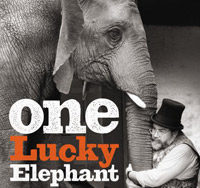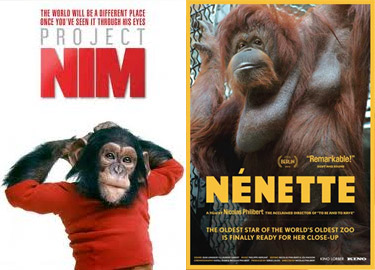Nathaniel in Nashville Pt. 3: It's A Zoo
 Tuesday, April 19, 2011 at 7:30PM
Tuesday, April 19, 2011 at 7:30PM In the previous festival post we were speaking briefly of "normal" movies versus festival choices. Here's a prime example of an odd thing that developed whilst movie watching... I ended up seeing virtually three documentaries in a row about our "friends" in the animal kingdom. This triple feature started out normally enough with just one movie. With Charlie Chaplin's The Circus coming up tomorrow for "Hit Me With Your Best Shot" and circus epic bestseller adaptation Water For Elephants opening for Easter weekend, circuses were heavy on me brain. So I thought I'd take in a documentary called One Lucky Elephant about a circus performer and the ongoing ethical dilemma of wild animals being enslaved to provide us with entertainment. I love elephants and I did actually ride on one as a kid.

I did not actually play "Boy" in a leopard print loincloth whilst riding on an elephant with daddy Tarzan (Buster Crabbe version) but that's how I'm remembering it for my illustrative amusement. Knowing myself as a young boy, it's also probably what I pretended I was doing at the time.
Have you ever had this experience? (The elephant riding not the Tarzan fantasies.)
I don't even recall in what context this elephant experience happened (state fair???). Virtually the only things I remember about it were that I was terrified and thrilled simultaneously and that I had never ever ever felt something living that was that enormous moving. The sensation is different than riding a horse (which I hadn't done at that point in my life) and the elephant was such a behemoth force of nature that it was almost like being jostled about while floating on waves if the waves were solid, dense, wrinkly and alive. Bizarre.
 But watching One Lucky Elephant, which is getting a theatrical run in the summer I believe, and which Oprah has picked up for her TV network, I felt pangs of guilt. If we weren't so fascinated by animals, would they be enslaved and taken from their families to entertain us?
But watching One Lucky Elephant, which is getting a theatrical run in the summer I believe, and which Oprah has picked up for her TV network, I felt pangs of guilt. If we weren't so fascinated by animals, would they be enslaved and taken from their families to entertain us?
The movie was about a man who had raised a baby elephant "Flora", made her the star of his travelling circus and realized in his later years that the elephant would long outlive him and parting with her was a economically and geographically complex problem and also fraught with emotional upheavals. Flora, like so many captive elephants, does have a heartbreaking violent episode in the movie that doesn't seem to mesh with her personality otherwise and one of the rich threads of the movie is the circus owner's painful realizations that this animal who has lived with him for her whole life is still unknowable. There was a terrific intense Q&A after the movie -- people have such strong feelings about the animal kingdom -- and I recommend seeing it if you get a chance. You can read more about the movie here.
After that I joined some of my festival friends who were super into the idea of seeing Project NIM, which I believe Katey had recommended to us a few podcasts ago. It's the new film from Oscar winning documentarian James Marsh (Man on Wire). Snce my mind was just reeling from all these animals-in-captivity issues, I figured "Triple Feature" and finished it off with the French documentary Nénette about a very popular but miserable Orangutan. Nénette is like a non-fiction simian counterpart to Eeyore she is so bummed out about her life in the Paris Zoo.

I must say that I've never seen documentaries so closely related in theme that feel so illustrative of the Hollywood Blockbuster vs. Difficult Art Film equation. Nim is slick, mainstream and eager to please. Nénette refuses to care about whether or not you're enjoying yourself and expects you to come to it. As all honest movie-lovers know, there are pleasures and junk to be found at both ends of this divide. I wouldn't label Nénette junk at all, don't misunderstand, but in this case I just couldn't deal with the difficult art film.
NIM, which covers the life story of Nim Chimpsky, raised by humans and taught to sign until he is abandoned to science is hugely accessible, very funny, and then completely disturbing; it's going to be a huge hit (at least insofar as documentaries go). Meanwhile, Nénette is morose, contemplative and monotonous; There is no arc, no release, no story, just you looking at the animal. Nénette is almost like a trancy tone poem on all the topics these three films adress: human fascination with animals, our inability to stop anthropomorphizing, the misery of captivity, questions without answers "what are animals thinking?", and how our relationships to animals are often extremely telling about our relationships to people. I'm quite sure I was absolutely in the wrong mood for Nénette. Either I had had too much of the topic or I just couldn't go with its complete lack of narrative and spotty context free information. I didn't enjoy it at all. I admired what I thought was an attempt to force you into noticing all the projections we do on animals by playing constant human voiceovers -- some funny, some thoughtful, some merely white noise -- but the visual withholding just angered me. I need more variety in a film and I couldn't even get a sense of how think the glass was surrounding Nénette or even how small or large her prison was, was because the movie, was so monotonously confrontational about making sure you were always considering Nénette's eternally sad very expressive face.
 Buster Crabbe,
Buster Crabbe,  Nashville,
Nashville,  Project NIM,
Project NIM,  Tarzan,
Tarzan,  childhood,
childhood,  film festivals,
film festivals,  zoology
zoology 

